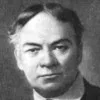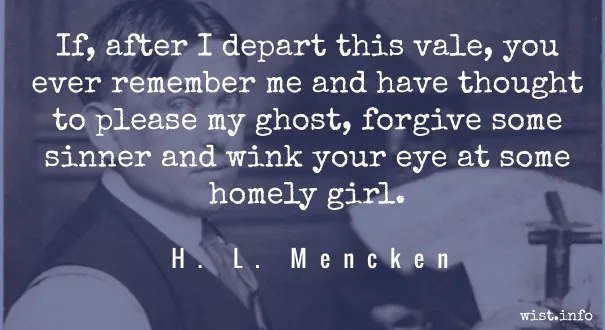The ways of dead people are not our ways. They have a very oblique way of expressing themselves, and often they’ll tell you something that can be interpreted many ways; it gives them a way out while preserving their reputation for infallibility.
S. P. Somtow (b. 1952) Thai-American music composeer, conductor, author [Somtow Papinian Sucharitkul; สมเถา สุจริตกุล; Somthao Sucharitkun]
“Lottery Night,” World Fantasy Convention Program Book (1989-10)
(Source)
Collected in Gardner Dozois, ed., Year's Best Science Fiction 7 (1990) and Somtow, Dragon's Fin Soup (1998).
Quotations about:
ghost
Note not all quotations have been tagged, so Search may find additional quotes on this topic.
I like to sit and have a talk sometimes with that odd little chap that was myself long ago. I think he likes it too, for he comes so often of an evening when I am alone with my pipe, listening to the whispering of the flames. I see his solemn little face looking at me through the scented smoke as it floats upward, and I smile at him; and he smiles back at me, but his is such a grave, old-fashioned smile. We chat about old times; and now and then he takes me by the hand, and then we slip through the black bars of the grate and down the dusky glowing caves to the land that lies behind the firelight. There we find the days that used to be, and we wander along them together. He tells me as we walk all he thinks and feels. I laugh at him now and then, but the next moment I wish I had not, for he looks so grave I am ashamed of being frivolous. Besides, it is not showing proper respect to one so much older than myself — to one who was myself so very long before I became myself.
Jerome K. Jerome (1859-1927) English writer, humorist [Jerome Klapka Jerome]
Idle Thoughts of an Idle Fellow, “On Memory” (1886)
(Source)
First published in Home Chimes (1885-09-26).
GHOST, n. The outward and visible sign of an inward fear.
Ambrose Bierce (1842-1914?) American writer and journalist
“Ghost,” The Cynic’s Word Book (1906)
(Source)
A play on the traditional Christian (from St Augustine) definition of sacrament: "an outward and visible sign of inward and spiritual grace."
Included in The Devil's Dictionary (1911). Originally published in the "Devil's Dictionary" column in the San Francisco Wasp (1885-02-28).
And now you’ll be telling stories
of my coming back
and they won’t be false, and they won’t be true,
but they’ll be real.Mary Oliver (1935-2019) American poet
“The First Time Percy Came Back,” A Thousand Mornings (2012)
(Source)
Poor child, most tried of men, Persephone, daughter of Zeus, is not deceiving you in any way; this is the law that rules all mortals at their death. For just as soon as life has left the white bones, and the sinew no longer hold together bones and flesh, when the erupting force of blazing fire undoes the body, then the spirit wanders: much like a dream, it flits away and hovers, now here, now there.
[‘ὤ μοι, τέκνον ἐμόν, περὶ πάντων κάμμορε φωτῶν,
οὔ τί σε Περσεφόνεια Διὸς θυγάτηρ ἀπαφίσκει,
ἀλλ᾽ αὕτη δίκη ἐστὶ βροτῶν, ὅτε τίς κε θάνῃσιν:
οὐ γὰρ ἔτι σάρκας τε καὶ ὀστέα ἶνες ἔχουσιν,
ἀλλὰ τὰ μέν τε πυρὸς κρατερὸν μένος αἰθομένοιο
δαμνᾷ, ἐπεί κε πρῶτα λίπῃ λεύκ᾽ ὀστέα θυμός,
ψυχὴ δ᾽ ἠύτ᾽ ὄνειρος ἀποπταμένη πεπότηται.]Homer (fl. 7th-8th C. BC) Greek author
The Odyssey [Ὀδύσσεια], Book 11, l. 216ff (11.216) (c. 700 BC) [tr. Mandelbaum (1990)]
(Source)
Anticleia, Odysseus' mother, responding to him when he's unable to embrace her shade in the Underworld. (Source (Greek)). Alternate translations:O son, she answer’d, of the race of men
The most unhappy, Our most equal Queen
Will mock no solid arms with empty shade,
Nor suffer empty shades again t’ invade
Flesh, bones, and nerves; nor will defraud the fire
Of his last dues, that, soon as spirits expire
And leave the white bone, are his native right,
When, like a dream, the soul assumes her flight.
The light then of the living with most haste,
O son, contend to.
[tr. Chapman (1616)]Oh no, quoth she, my son, she’d no intent
T’ abuse you. ’Tis the nature of the dead.
We are no longer sinews, flesh, and bones,
We are substances incorporeal,
All that ’s consumed i’ th’ fun’ral fire; when once
That’s done, it in itself stands several;
Flies like a dream.
[tr. Hobbes (1675), l. 203ff]O son of woe, the pensive shade rejoin'd;
O most inured to grief of all mankind!
"'Tis not the queen of hell who thee deceives;
All, all are such, when life the body leaves:
No more the substance of the man remains,
Nor bounds the blood along the purple veins:
These the funereal flames in atoms bear,
To wander with the wind in empty air:
While the impassive soul reluctant flies,
Like a vain dream, to these infernal skies.
[tr. Pope (1725)]Ah, son! thou most afflicted of mankind!
On thee, Jove’s daughter, Proserpine, obtrudes
No airy semblance vain; but such the state
And nature is of mortals once deceased.
For they nor muscle have, nor flesh, nor bone;
All those (the spirit from the body once
Divorced) the violence of fire consumes,
And, like a dream, the soul flies swift away.
[tr. Cowper (1792), l. 258ff]O my child,
'Tis not Persephone deludes thee here.
This is their portion who, from light exiled,
Dying descend into these regions drear,
Sinewless, fleshless, boneless. On the bier
All substance was burnt out by force of fie,
When first the spirit, her cold flight to steer,
Left the white bones , and fluttering from the pyre
Straight to these shadowy realms did like a dream retire.
[tr. Worsley (1861), st. 32]Alas! my child! thou most ill-starred of all men!
'Tis not Persephone--Zeus' daughter, fools thee!
But this is the way with mortals, when they're dead.
Their powers no more are clothed with flesh and bones;
But these the mighty strength of the blazing fire
Consumes, when once life's left the calcined bones,
And the soul, like a dream, on wings hath fled away.
[tr. Bigge-Wither (1869), l. 217ff]Ah me, my child, of all men most ill-fated, Persephone, the daughter of Zeus, doth in no wise deceive thee, but even on this wise it is with mortals when they die. For the sinews no more bind together the flesh and the bones, but the great force of burning fire abolishes these, so soon as the life hath left the white bones, and the spirit like a dream flies forth and hovers near.
[tr. Butcher/Lang (1879)]O me, my child, my darling, most hapless man of men,
Persephone, daughter of Zeus, beguileth thee nought hereby,
But this is the lot of mortals when at last they come to die;
For no longer then the sinews hold together flesh and bone,
But they by the might of the fire bright-flaming are undone,
When first from the white bones wendeth the soul and living breath,
And the soul as a dream forth flieth and flitting hovereth.
[tr. Morris (1887)]Ah, my own child, beyond all men ill-fated! In no wise is Persephone, daughter of Zeus, beguiling you, but this is the way of mortals when they die: the sinews no longer hold the flesh and bones together; for these the strong force of the flaming fire destroys, when once the life leaves the white bones, and like a dream the spirit flies away.
[tr. Palmer (1891)]My son, she answered, most ill-fated of all mankind, it is not Proserpine that is beguiling you, but all people are like this when they are dead. The sinews no longer hold the flesh and bones together; these perish in the fierceness of consuming fire as soon as life has left the body, and the soul flits away as though it were a dream. [tr. Butler (1898)]But this is the appointed way with mortals when one dies. For the sinews no longer hold the flesh and the bones together, but the strong might of blazing fire destroys these, as soon as the life leaves the white bones, and the spirit, like a dream, flits away, and hovers to and fro.
[tr. Murray (1919)]Alas my hapless child! Here is no mockery from Persephone, daughter of Zeus: it is the common judgment upon all mortals when they die. Then the nerves will no more bind flesh and frame into one body, for the terrible intensity of the searing fire subdues them till they vanish, as the quickening spirit vanishes from the white bones and the soul flies out, to hover like a dream.
[tr. Lawrence (1932)]My child, my child! came her reply. What man on earth has more to bear than you? This is no trick played on you by Persephone, Daughter of Zeus. You are only witnessing here the law of our mortal nature, when we come to die. We no longer have sinews keeping the bones and flesh together, but once the life-force has departed from our white bones, all is consumed by the fierce heat of the blazing fire, and the soul slips away like a dream and flutters on the air.
[tr. Rieu (1946)]O my child -- alas,
most sorely tried of men -- great Zeus' daughter,
Persephone, knits no illusion for you.
All mortals meet this judgment when they die.
No flesh and bone are here, none bound by sinew,
since the bright-hearted pyre consumed them down --
the white bones long exanimate -- to ash;
dreamlike the soul flies, insubstantial.
[tr. Fitzgerald (1961)]Oh my child, ill-fated beyond all other mortals, this is not Persephone, daughter of Zeus, beguiling you, but it is only what happens, when they die, to all mortals. The sinews no longer hold the flesh and the bones together. The queens of the past and once the spirit has left the white bones, all the rest of the body is made subject to the fire's strong fury, but the soul flitters out like a dream and flies away.
[tr. Lattimore (1965)]My son, my son, the unluckiest man alive!
This is no deception sent by Queen Persephone,
this is just the way of mortals when we die.
Sinews no longer bind the flesh and bones together --
the fire in all its fury burns the body down to ashes
once life slips from the white bones, and the spirit,
rustling, flitters away ... flown like a dream.
[tr. Fagles (1996)]O my child, most ill-fated of men,
It is not that Persephone is deceiving you.
This is the way it is with mortals.
When we die, the sinews no longer hold
Flesh and bones together. The fire destroys these
As soon as the spirit leaves the white bones,
And the ghost flutters off and is gone like a dream.
[tr. Lombardo (2000)]Alas, my child, came my revered mother's reply, ill-fated above all men! This is no trick played on you by Persephone, Daughter of Zeus. It is the law of our mortal nature, when we come to die. We no longer have sinews keeping the bones and flesh together; once life has departed from our white bones, all is consumed by the fierce heat of the blazing fire, and the soul slips away like a dream and goes fluttering on its ways.
[tr. DCH Rieu (2002)]Ah my child, ill-fated beyond all men! It is not that Persephone, daughter of Zeus, is deceiving you, but it is the law that touches all mortal beings when they die: no longer do they have sinews that bind flesh and bone together, for as soon as the spirit departs from their white bones, the fierce heat of the blazing fire destroys everything, and their shade flies off, fluttering like a dream.
[tr. Verity (2016)]Oh, my child! You are the most unlucky man alive. Persephone is not deceiving you. Thsi is the rule for mortals when we die. Our muscles cease to hold the flesh and skeleton together; as soon as life departs our white bones, the force of blazing fire destroys the corpse. The spirit flies away and soon is gone, just like a dream.
[tr. Wilson (2017)]Alas, my child, ill-fated beyond all other mortals, Persephonē, daughter of Zeus, is in no way beguiling you. No, this is the fixed law for mortals, when anyone dies: The sinews no longer keep flesh and bones together, they're destroyed by the powerful force of blazing fire as soon as the spirit departs from the white bones and the soul, like a dream, flies fluttering off, is gone.
[tr. Green (2018)]My child, of all men most unfortunate,
no, dread Persephone, daughter of Zeus,
is not deceiving you. Once mortals die,
this is what’s ordained for them. Their sinews
no longer hold the flesh and bone together.
The mighty power of a blazing fire
destroys them, once our spirit flies from us,
from our white bones. And then it slips away,
and, like a dream, it flutters to and fro.
[tr. Johnston (2019), l. 268ff]
Ghosts seem harder to please than we are; it is as though they haunted for haunting’s sake — much as we relive, brood, and smoulder over our pasts.
Elizabeth Bowen (1899-1973) Irish author
The Second Ghost Book, Preface (1952) [ed. C. Asquith]
(Source)
Time does not bring relief; you all have lied
Who told me time would ease me of my pain!
I miss him in the weeping of the rain;
I want him at the shrinking of the tide;
The old snows melt from every mountain-side,
And last year’s leaves are smoke in every lane;
But last year’s bitter loving must remain
Heaped on my heart, and my old thoughts abide!
There are a hundred places where I fear
To go, — so with his memory they brim!
And entering with relief some quiet place
Where never fell his foot or shone his face
I say, “There is no memory of him here!”
And so stand stricken, so remembering him!
True love, like a ghost, is much talked of but seldom seen.
[Il est du véritable amour comme de l’apparition des esprits tout le monde en parle, mais peu de gens en ont vu.]
François VI, duc de La Rochefoucauld (1613-1680) French epigrammatist, memoirist, noble
Réflexions ou sentences et maximes morales [Reflections; or Sentences and Moral Maxims], ¶76 (1665-1678) [tr. Stevens (1939)]
(Source)
Present in the 1st (1665) edition; in that edition, the first phrase read more globally as "Il est de l’amour comme de l’apparition ..."
(Source (French)). Alternate translations:It is with True Love, as with Ghosts and Apparitions, a thing that every body talks of, and scarce any body hath seen.
[tr. Stanhope (1694), ¶77]It is with true love as with apparitions. Every one talks of it, but few have ever seen it.
[ed. Gowens (1851), ¶80]There is real love just as there are real ghosts; every person speaks of it, few persons have seen it.
[tr. Bund/Friswell (1871)]True love is like a ghost; everyone talks of it, few have seen it.
[tr. Heard (1917)]True love is like psychic experience. Everybody tells ghost stories but few of us have ever seen a ghost.
[tr. FitzGibbon (1957)]True love is like seeing ghosts; we all talk about it, but few of us have ever seen one.
[tr. Kronenberger (1959)]True love is like ghostly apparitions: everybody talks about them but few have ever seen one.
[tr. Tancock (1959)]It is with true love as it is with ghosts: everybody talks about it, but few have seen it.
[tr. Whichello (2016)]










